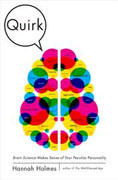Quirk
Hannah Holmes
book reviews:
· general fiction
· chick lit/romance
· sci-fi/fantasy
· graphic novels
· nonfiction
· audio books
· author interviews
· children's books @
curledupkids.com
· DVD reviews @
curledupdvd.com
newsletter
win books
buy online
links
home
for authors
& publishers
for reviewers

 |
Quirk: Brain Science Makes Sense of Your Peculiar Personality Hannah Holmes Random House Hardcover 288 pages February 2011 |
|
The old question “Are you a man or a mouse?” will take on different meaning to you after you read this book, a delightful combination of science and human-friendly speculation by an author known for her debunking discoveries (The Well-Dressed Ape, The Secret Life of Dust).
Addicted mice are much like addicted people – geezed up with dopamine that is triggered when pleasure is on offer, they will beg for more of everything, from sugar to alcohol to cocaine. To change this pattern requires breeding targeted at self-discipline. Even marathon-running rats fall easily prey to drug addiction. The key to overcoming this syndrome is the personality type classified as Conscientious (the other types analyzed in the book are Extraverted, Neurotic, Agreeable, and Open – along with their opposites). If you keep a regular schedule, exercise, eat right and strive for perfection, you will be less prone to addiction. Addicted rats, like addicted people, are impulse-ridden. Extraverts are tough – they have to be, to survive. They have the good fortune to be generally cheerful and assertive (but of course, cheerfulness can lead to a Pollyanna outlook that is not helpful in a real disaster, and assertiveness may look good to the boss but bad to a perceived enemy as it morphs into missile launch aggression). Agreeableness leads to cooperation, but though this is an ideal for many, it is not necessarily a survival characteristic. Close contact causes disease to spread and stifles initiative, whereas individualism by contrast is a big spur to reproduction, something that we definitely can’t do without. A mouse, or a person, who is too conscientious and tries to do too much at once will miss essential survival cues that a lazier, less driven individual might pick up on as he casually noodles along. Holmes makes it clear that there are no winners in the personality sweepstakes – by studying rats, we see that one quirk can be overridden by another. If you are too open, you will be prey to everyone’s opinions, and if you are not neurotic enough, you may miss signs of impending danger. The book illustrates the slow evolution of these factors and the brain science behind them. Holmes shows us how a lab rat can demonstrate an artistic bent and a sense of trust akin to religion. As she states, “The surprise wasn’t how simple and biological the human personality is. It was how complex and diverse mouse personality is.” But one rather encouraging conclusion is that most of us wouldn’t change things much even if we could – if you got rid of a single personality trait, you’d be slowing down our evolution as unique individuals by eliminating something important that has brought all of us to this point and will take us beyond it. The big message of Quirk Originally published on Curled Up With A Good Book at www.curledup.com. © Barbara Bamberger Scott, 2011 |
|
|
|
 Click here to learn more about this month's sponsor! |
|
| fiction · sf/f · comic books · nonfiction · audio newsletter · free book contest · buy books online review index · links · · authors & publishers reviewers |
|
| site by ELBO Computing Resources, Inc. | |
 Hannah Holmes is here to tell us that we have no “divine spark” (“spark schmark” is her exact response) and no particular distinguishing characteristics that make us notably different from the mice being studied in labs all around the world. Mice have feelings. They have personalities. And by examining their actions and reactions we can
- like it or not - learn a lot about ourselves. Some mice, faced with new and jarring circumstances, will cringe and startle and hide, while others will take the new situation as a challenge. In a lab-constructed swimming pool, some will try to clamber out while others will just – float. Mice, it turns out, are awfully good at floating. Not unlike, perhaps, your twenty-something son.
Hannah Holmes is here to tell us that we have no “divine spark” (“spark schmark” is her exact response) and no particular distinguishing characteristics that make us notably different from the mice being studied in labs all around the world. Mice have feelings. They have personalities. And by examining their actions and reactions we can
- like it or not - learn a lot about ourselves. Some mice, faced with new and jarring circumstances, will cringe and startle and hide, while others will take the new situation as a challenge. In a lab-constructed swimming pool, some will try to clamber out while others will just – float. Mice, it turns out, are awfully good at floating. Not unlike, perhaps, your twenty-something son.